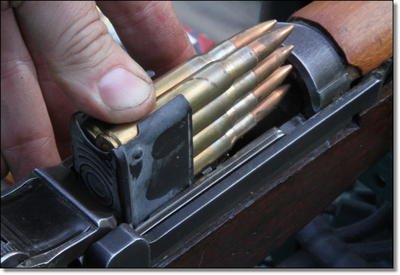This imperative phrase originally referred to the operation of the M1 Garand Rifle, the standard U.S. Army rifle of WWII. Its meaning is more general now, referring to preparation for any imminent event.
To load an M-1 Garand, the bolt would be locked to the rear and a clip of ammunition loaded into the receiver.
The command
lock and load was immortalized by John Wayne in the 1949 movie
The Sands of Iwo Jima:
"Lock and load, boy, lock and load."
There are earlier uses of the command reversed,
load and lock. This command, primarily used on firing ranges, referred to the loading of a single round into the Garand (or into another weapon). In this case, the
lock referred to striking the bolt handle with the heel of the hand to ensure it was fully closed and locked into place.
From Gene Gach’s 1942
In The Army Now:
One round, ball ammunition, load and lock!
There is even an instance of this usage going back the Spanish-American War; although it’s not certain if this was a phrase current at the time or just a coincidental use of the words. From the
Annual Reports of the War Department, 1900, a dispatch from the Philippines, 15 June 1899:
The line was under strong long-range fire and the order was given to load and lock the pieces; investigation proved that the white objects seen were the marines returning to their ship.
The term
lock in this phrase is a different use of the word than in references to the firing mechanism of a weapon, as in
flintlock.
(Source:
Historical Dictionary of American Slang)


